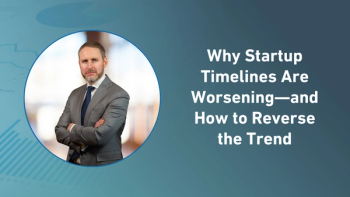
Amidst DCTs, Will Sites be Cut From Clinical Research?
Mary Costello, Head of Site and Investigator Networks at Medable, and Stephanie Abbott, Clinical Research Director at Western Washington Medical Group, discuss the changing landscape of decentralized clinical trials.
Many sites are concerned that Decentralized Clinical Trial (DCT) models will cut the site from research altogether. Terms such as “siteless trials” have been used to describe DCTs; however, some enterprises disagree with that notion. Medable, a DCT company, launched the Site Network Council (SNC) to bridge the gap between DCTs and study sites. In this interview, Mary Costello, Head of Site and Investigator Networks at Medable, and Stephanie Abbott, Clinical Research Director at Western Washington Medical Group, will discuss the changing landscape of DCTs.
Moe: Medable launched its SNC in September of this year, but it is a concept that you have been thinking about for some time. Describe the ideas that led to the creation of the Council.
Mary Costello: When I joined Medable, part of my responsibility was to bring a site perspective to product development, as historically sites have often been cut out of the development process. We announced the SNC in September, but we really launched it at the beginning of 2021 and have been working together for months. One of our main goals was to identify whether technology slows sites and encumbers their work or helps. Could tech be better designed, and how could we help?
Even with this goal, the SNC didn’t just look at Medable’s platform. Instead, we looked at the entire research process from a site perspective, and a lot of our work has been focused on on-site training, which is a significant pain point for staff.
Stephanie Abbot: Medable’s SNC has had several discussions about sites’ pain points regarding technology. As the research director of a site, I’ve experienced a lot of pain points! There are similarities and differences in that pain depending on where you come from and if you’re a free-standing site, part of a network, or are an academic institution. Even so, we’ve uncovered a lot of common themes
Mary: One other important element of the SNC is our focus on inclusivity to learn from many points of view. We have eight inaugural members that represent a wide range of different clinical sites. We have traditional standalone sites that only do research, such as Rochester Clinical Research. We have an academic medical center and several blended healthcare practices. We have a member that is responsible for bringing research into Federally Qualified Health Centers (FQHCs). We have Sun Valley Research Center at the border of Mexico and California, which works with a predominantly Hispanic population. VitaLink Research, now part of Velocity Research, a network of sites in the Southeast, is also a member and, we’re planning to expand into other parts of the U.S. and the EU.
By having access to real-life insights from a range of sites, we can build a flexible solution that can be tailored to all. This group brings different experiences so we can bounce ideas off each other. In addition, they offer a transparent window into all research environments to help Medable create decentralized clinical trial workflows that meet sites’ changing needs and enable greater participation in DCTs.
Moe: Could sites be cut out of the research process altogether with DCTs?
Mary: This is one of those times when words matter—and anyone referring to decentralized trials as siteless trials hasn’t considered the vital role that the site team plays in supporting research. The phrase removes the linchpin of trials, practically excommunicating a whole group of key stakeholders. Why do we want to remove the human connection from clinical research? It makes no sense, especially as the connection between the patient and the study team is the #1 reason why patients stay enrolled in trials.
The site model will undoubtedly evolve as the definition of what comprises a site becomes more dynamic to include pharmacies and other unique settings. All will need to adjust, but good technology should provide greater flexibility to both sites and patients. Sites want easy-to-use technology that allocates high-value resources to clinical needs and focuses more on patients. We don’t believe that research will become completely remote. Instead, Medable wants to design solutions that work for all stakeholders and for every type of research setting, hybrid, virtual, or in-person. I am passionate about this because the site relationship is why patients stay in a trial. They may come for the promise, but they stay for the people.
Medable never wants to take the site out of the research equation. We believe it remains the core of research, and we want to support sites in this evolution and provide more flexibility. Technology disrupts our traditional clinical research model, and we may see some research conducted in local pharmacies soon. We will have to be creative—especially for those in rare disease trials and patients who live hundreds of miles from a traditional site—and work to support a variety of situations. However, sites will still be the cornerstone of research.
Stephanie: At Western Washington, we had various opportunities to participate in decentralized trials over the past year or so. Similarly, in healthcare, telemedicine wasn’t previously happening, and healthcare payors didn’t support the use of telemedicine at first. But then comes COVID, and we needed to reinvent how we can meet people where they are, regardless of the circumstances.
The silver lining from this horrible pandemic is that we were all forced to get creative and try new research methods. Now we have another layer, more ways to deliver care, and that is huge. If our industry is not able to evolve, then we will not be able to provide the treatments to patients or get them approved in a reasonable timeframe. It’s a balance—leverage modern technology and bringing humanity back to healthcare and clinical research.
Moe: We’re all using so many different eClinical technologies today. How can sites get more proficient at using these technologies?
Mary: I think what’s hard right now is that we have so many different technologies – for instance, EHR systems, CTMS systems, EDC systems (which people are talking about retiring). There are the TransCelerate sponsored single investigator platforms, but then even some of the original founding sponsors aren’t using that platform. Should the site invest in the technology when some of it becomes obsolete? And which solutions should they bet on for their future?
As a bridging strategy, some sites have hired digital natives—staff who don’t have a background in patient care but know modern technology. They may be just out of school, but they’ve never touched paper their whole career. The site brings them in to train patients on using eClinical technologies, support the staff, and troubleshoot, but this is an added cost to the site. At Medable, we are working to develop solutions that fit into sites’ everyday workflows and are easy for them to use and manage.
That is how we will drive and shape the industry because there are a lot of fast followers in the tech space—once you lead, many will follow. Yet, there are very few willing to be the first to cross the chasm.
Stephanie: I am a healthcare provider by training, and I have worked in research for over 20 years. And, if I have to need to download a big training manual to use new technology, I’m not going to read it. If it doesn’t work intuitively, then it might as well be broken. On the other hand, we are consumer users of technology, so we get the basics—we have iPhones and bank online, and we expect technology to be almost as easy to use in the clinical research environment. I think someday sites will get fed up and not deal with it anymore.
We have turned down studies because they come with unruly technology. We can’t hire enough people with enough skillsets to manage those types of trials. I have one vendor we don’t work with because it takes at least three hours to onboard a patient using their product despite promises that it will streamline that process. On the other hand, initiatives like those of CTTI and Medable with its Site Network Council set higher expectations, and sponsors will either step up or not have many choices but to step out.
Moe Alsumidaie, MBA, MSF, is a thought leader and expert in the application of business analytics toward clinical trials, and Editorial Advisory Board member for and regular contributor to Applied Clinical Trials.
Newsletter
Stay current in clinical research with Applied Clinical Trials, providing expert insights, regulatory updates, and practical strategies for successful clinical trial design and execution.




